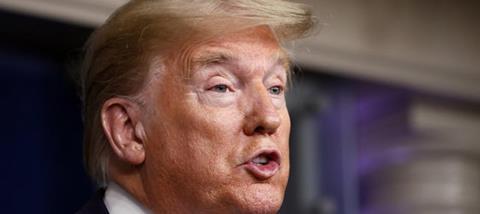
How can Christians with a traditional view on morality and the Bible vote for Donald Trump? He stands accused of multiple counts of sexual harassment, has pursued married women, has become rich running casinos, and was even impeached for abuse of power (although the Senate later acquitted him). And it isn’t just his morality. The Washington Post claims that Donald Trump has made an astonishing 20,000 false or misleading claims while in office - over 1,000 of these were about coronavirus.
It’s so easy to line up and take shots – we all do it. Recently the Financial Times reported a statement from Trump that America should reduce its coronavirus testing capability - in order to bring down the numbers. It's a comment so far off the scale it leaves me wondering if it’s brilliant.
America’s unpredictable president is easy to criticise. But don’t we also owe it the millions who will vote for him in 2020 to understand why?
Some may find these next paragraphs unpalatable – it doesn’t suit the narrative to talk positively about Trump’s appeal. But he does have appeal.
Trump surfed into the White House on a national wave of anger. This was mostly from white working-class voters – the least well off, the unemployed, the have-nots. These people resent the professional elite because they feel scorned by them, but they connect with Trump because he apparently feels the same anger at being belittled as they do. And they rather admire the fact that Trump is actually very good at making money.
Another attribute that people like is Trump’s certainty. Trump is certain about many things and certainty sells. He takes the truth as he sees it and he calls it out, candidly and bluntly. He doesn’t care who gets offended. We may disagree with him, but we are rarely in doubt as to what he thinks. This “clear decisiveness” is something many politicians lack. They tend to worry about opinions and they nuance their statements in ways that make them hard to understand. Certainty sells and Trump is certain about many things even when he is wrong. And people like that. It wrong-foots his opponents (and people like that too).
And then there are his notable achievements on the world stage. Two come immediately to mind. Most recently he presided at a Middle East peace agreement between Israel and UAE/Bahrain. This may appear minor in impact – and probably fueled more by mutual distrust of Iran than anything else - but it is a significant step forward, and Saudi Arabia may soon be added to this group. And secondly, Americans are grateful for his insistence that the European members of NATO contribute a greater share to the financial pot.
But more than any of this, it is Donald Trump’s positive stance on “the right to pray” in schools, his intention to place Bibles back in schools, his support for “traditional marriage”, and his stance on pro-life that draws evangelical Christians. And it comes back to something he said in 2016.
“Christianity will have power”
Four years ago as Trump began his 2016 campaign, he gave a speech at a small Christian University in rural Iowa in which he made a straightforward promise. “Christianity is under siege” he said, before adding, “Christianity will have power. If I’m there, you’re going to have plenty of power, you don’t need anybody else. You’re going to have somebody representing you very, very well. Remember that.”
A simple certain statement like that sells. Its unambiguous, it’s clear, it’s targeted to one group. It’s a promise, he has repeated, and, arguably, a promise he has kept.
It makes you wonder...If your national leader stood up and made a promise that your brand of Christianity will have power, what would you do?
Of course, Trump’s promise was been targeted at a narrow group of people – largely straight, white, married, conservative evangelical Christians – but these make up 20% of the US electorate. These Christians say they are protecting traditional Christian values from being eroded by the secularisation of the Western world. Most of them don’t like Donald Trump, but they understand him. Their relationship with him is transactional - they vote and he makes the country more to their liking. They feel safe with Trump in charge because their highly conservative Christian values will be protected.
The problem is many of us, especially those of us outside the US, hear what the President says and we see what he tweets, but we don’t often see what he does.
So what happens now?
Nationally, Trump is trailing Biden in the polls, but that means little. Approximately 80% of evangelical Christians still say they will vote for Donald Trump and these people tend to turn out on voting day. So this is not a done deal, and the Democrats need to spend less time ridiculing Trump and more time understanding the people who vote for him.
The TV debates start in the early hours of tomorrow morning (UK time). The world and his dog are watching, and the stakes genuinely could not be higher. With issues such as the virus and the climate, and with uncertainties caused by China and the bizarre leader of North Korea, not to mention the increasing silencing of faith in public discussion, the world is at a tipping point and on many levels. In such a world we all need America to be great again. The question is, what do you mean by great?

































